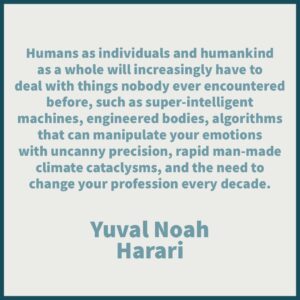 We can all agree that we are in the midst of exponential change, largely driven by technological innovations. Check out this short video on the Fourth Industrial Revolution to get a sense of the change we are dealing with.
We can all agree that we are in the midst of exponential change, largely driven by technological innovations. Check out this short video on the Fourth Industrial Revolution to get a sense of the change we are dealing with.
Some further evidence…
…how rapidly vaccines were recently available, significantly exceeding expectations.
…how we can connect with content experts anywhere on the planet instantaneously via video and audio.
…how transportation is transforming with more environmentally friendly electric vehicles.
…and how about self-driving technology? Slowly but surely advancing…
Despite advancements such as these and an abundance of information, we still generally think of curriculum as disconnected content knowledge found in one container (a teacher or a textbook) and moved into another (a learner).
Not only has this framing been long outdated…the gap will only get wider as we move further into this exponential future if we don’t change our mindset.
Here’s a set of fun resources that can help us give our understanding of “curriculum” a much needed upgrade….Enjoy!
Yuval Noah Harari on what the year 2050 has in store for humankind
“Humans as individuals and humankind as a whole will increasingly have to deal with things nobody ever encountered before, such as super-intelligent machines, engineered bodies, algorithms that can manipulate your emotions with uncanny precision, rapid man-made climate cataclysms, and the need to change your profession every decade.”
Countdown to the Singularity – 2018-2030
2024 – Drones routinely deliver packages to rooftops of apartment buildings and surface robots deliver those packages from rooftops to doorsteps throughout the building.
These are the 4 biggest innovation challenges we must solve over the next decade
“Today, we’re seeing a similar shift from cognitive to social skills. Go into a highly automated Apple Store, to take just one example, and you don’t see a futuristic robot dystopia, but a small army of smiling attendants on hand to help you. The future of technology always seems to be more human.”
AI, Automation and the future of work: Ten things to solve for
“At the same time, these technologies [automation and artificial intelligence] will transform the nature of work and the workplace itself. Machines will be able to carry out more of the tasks done by humans, complement the work that humans do, and even perform some tasks that go beyond what humans can do. As a result, some occupations will decline, others will grow, and many more will change.”
Fragmentation: Underground activists fight for equity, privacy, and economic reform
“Why indulge in pessimistic thinking? Thinking about worst-case outcomes can actually be empowering. Many potential disasters seem like they would herald the end of the world. Upon reflection, however, we can create heroic narratives of how we could survive such cataclysms”
Q&A: How Harvard’s David Sinclair is Fighting Aging—and How You Can, Too
“What if someone told you that you could live for another 100 years… while remaining physically healthy and mentally sharp? You’d probably brush it off as science fiction. Turns out, it may be closer to fact.”
—–
❓ Provocations:
Do our current curriculum development processes support this changing landscape? How or how not? How might we think about reimagining our current processes to more adequately prepare learners for success?
💎 Resource:
The biggest hurdles recent graduates face entering the workforce
🧠 Mindsets:
Inventor
💡 Mindshift:
Navigating from curriculum as static to curriculum as fluid.
📣 Drop your thoughts in the comments, or in the Facebook group, and feel free to share resources. 🔥🔥🔥
- A silver lining - January 22, 2022
- Is our use of tech working against us? 🤔 - September 8, 2021
- What’s NOT going to change in the next 10 years? 🤔 - September 7, 2021